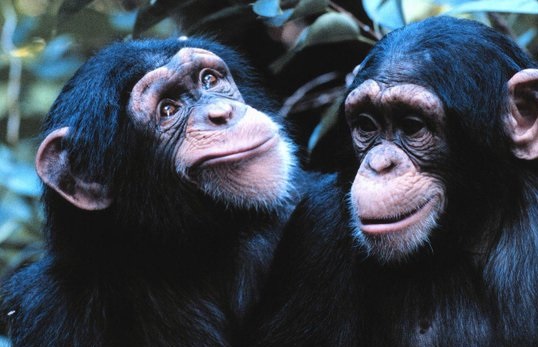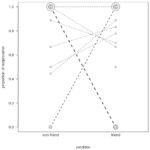Chimpanzees played the trust game to find out the basis of individual preference for other chimps
Trust is the foundation of close relationships in the world of chimpanzees, according to anthropologists at Max Planck Institute.
“Humans largely trust only their friends with crucial resources or important secrets,” said Dr. Jan Engelmann of the Max Planck Institute for Evolutionary Anthropology in Germany. “In our study, we investigated whether chimpanzees show a comparable pattern and extend trust selectively toward those individuals they are closely bonded with. Our findings suggest that they do indeed, and thus that current characteristics of human friendships have a long evolutionary history and extend to primate social bonds.”
Previous studies of chimpanzee friendships had shown that the animals were attracted to sociable partners for friendships, and that they extended their favors to those they preferred. The Max Plank researchers wanted to know if the basis for this preference was “trust.”

In order to find out, the researchers spent five months at Sweetwaters Chimpanzee Sanctuary in Kenya. They set up an arena where the Sweetwaters chimps could play “the trust game” — a game in which two separated chimpanzees get to decide if their partner gets a delicious treat or a less savory one. The partner in turn has the opportunity to share some of their treat back with the one who pulled the rope that opened the door to the treat.
The best case scenario is considered to be that the chimp with the rope will provide the other with the tasty treat, and the other will share some with the first chimp.
Before the researchers put the chimps in the experimental setting, the researchers observed the chimpanzee group to decide for each chimp which other animal was their favorite and least favorite. These two would be paired up against the first chimp in the game.
Each chimp played 12 rounds of the game with each their favorite and least favorite group member.
The result was that chimps were ” significantly more likely to voluntarily place resources at the disposal of a partner, and thus to choose a risky but potentially high-payoff option, when they interacted with a friend as compared to a non-friend.”
The researchers interpreted this finding to mean that chimpanzees show much greater trust when it comes to friends than non-friends.
“Human friendships do not represent an anomaly in the animal kingdom,” Engelmann said. “Other animals, such as chimpanzees, form close and long-term emotional bonds with select individuals. These animal friendships show important parallels with close relationships in humans. One shared characteristic is the tendency to selectively trust friends in costly situations.”
The report, “Chimpanzees Trust Their Friends,” was completed by Drs. Jan Maxim Engelmann and Esther Herrmann and was published in the journal Current Biology. View the research paper at this link.
By Andy Stern


